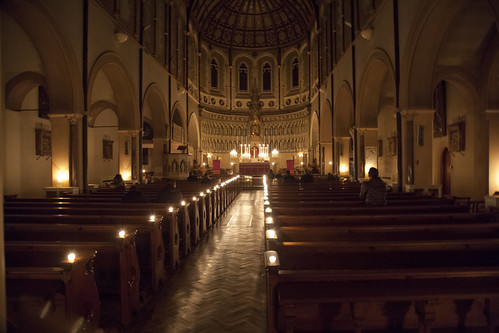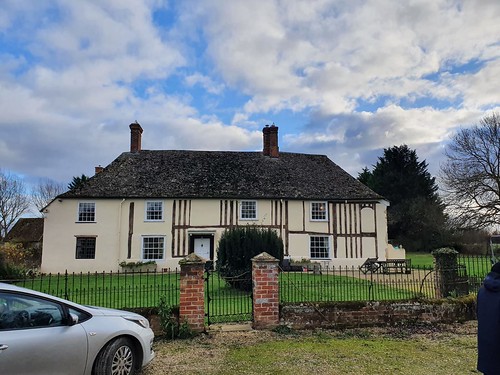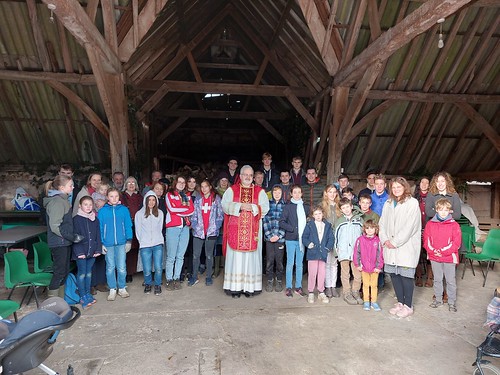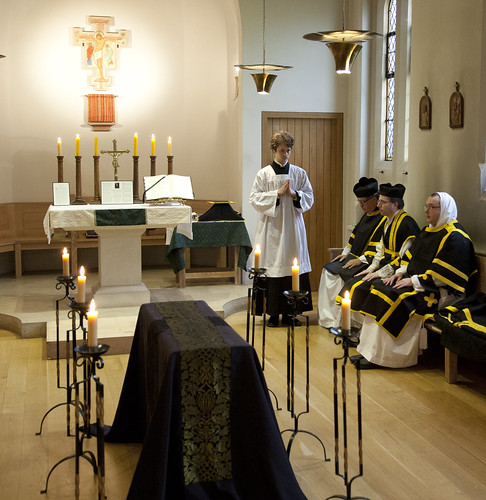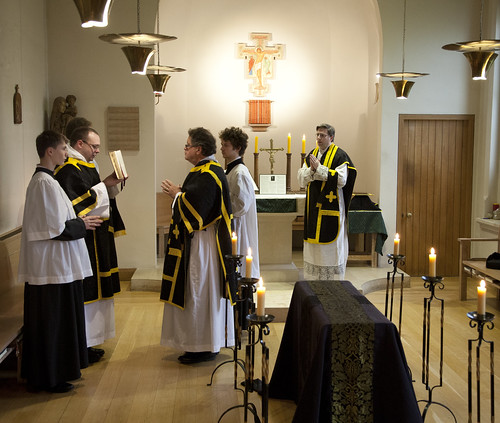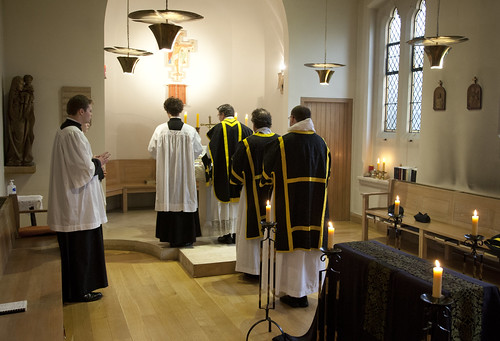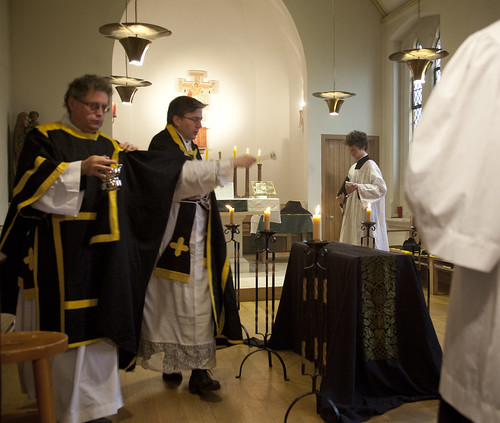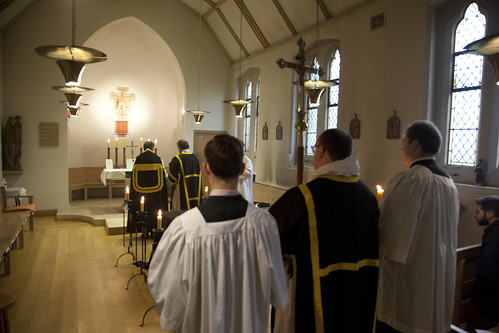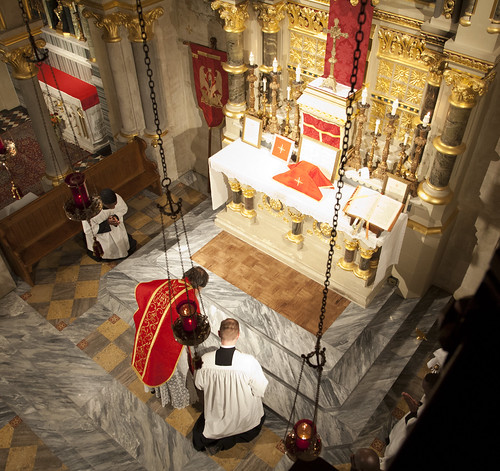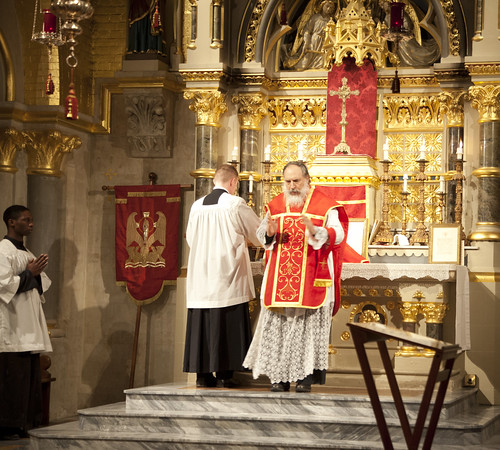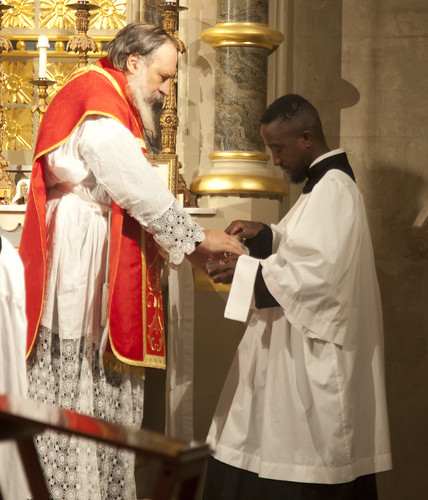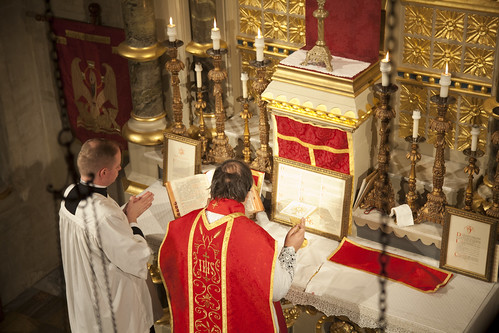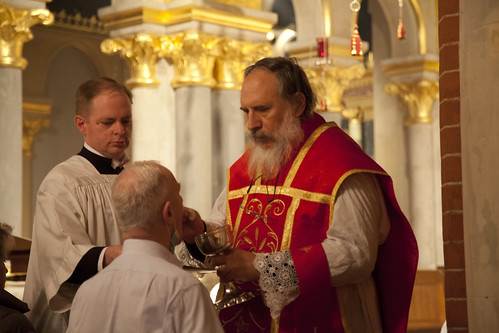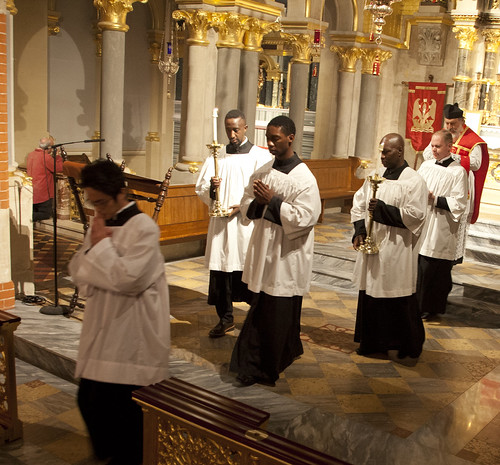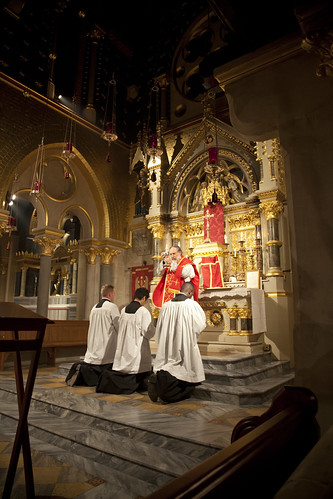Chairman's Blog
Responsa ad dubia: back to the future, forward to the past
 |
| The Holy Mile at Walsingham in 2018, in the rain. |
In the wake of the Responsa ad dubia from the Congregation for Divine Worship, there has been a fair amount of chatter on the internet about the uniquely bad situation Catholics attached to the Traditional Mass and Sacraments now find themselves in. As the canonists have got to work in interpreting the document, it turns out to have less force than previously assumed by many—and the Latin Mass Society has produced some notes to explain the situation in detail, which you can see here. Nevertheless, bishops have the power to follow its lead.
This may mean, for example, that in a particular diocese the number of celebrations of the Traditional Mass is drastically reduced, or stopped: indeed, in some dioceses this has already happened. Further, in places where it had been straightforward to get married using the older books, to have one’s baby baptized using them, or have one’s deceased loved ones buried using them, this may become a headache, or simply impossible. Again, finding out if Masses are happening may become difficult, if they are no longer simply advertised on online parish bulletins.
This situation, insofar as it becomes a reality, will certainly be unjust and pastorally harmful. Contrary to certain febrile suggestions on Twitter and elsewhere, however, it does not mean the end of the Latin Mass Society, or the Una Voce Federation, or similar bodies around the world. Because if this situation were to arise, it might be new to some of the younger Traditional Catholics on social media, but it would not be new to the Traditional movement as a whole. It would simply take back to before 2007, or perhaps before 1988.
Difficult or impossible to get a priest to celebrate a wedding or baptism according to the old books?![]()
Closest Traditional Mass an hour or more's drive away? ![]()
Masses not being publicly advertised, by order of the bishop? ![]()
Masses needing to kept away from the ordinary, legitimate, worshippers?![]()
Arbitrary restrictions and conditions placed on Masses?![]()
Official hostility expressed at every level of the Church? ![]()
Accusations of disloyalty and schismatic leanings? ![]()
How did we survive the lean years before 2007? Well, it was tough. Many, many supporters of the Latin Mass Society were only able to get to the old Mass for occasional celebrations: an annual Mass here, a pilgrimage there, a Day of Recollection somewhere else, often a long journey from where they lived. Some, particularly those with difficulty travelling, could get to no Masses at all. Coach trips from London were frequently part of LMS events, for people who didn’t have cars and were starved of opportunities to get to, especially, sung Masses. I remember driving an hour and a half each way to attend a High Mass (with deacon and subdeacon), with a good choir, in Portsmouth Cathedral, in about 2003, because these kinds of Masses hardly ever happened. It was only with considerable difficulty that the Latin Mass Society established, in the early 2000s, an annual celebration of the Sacrament of Confirmation in London, and people came from all over England, Scotland, and even France and Belgium.
The Fraternity of St Peter, founded in 1988 with the good will of Pope John Paul II, found it extraordinarily hard-going in the early years, indeed up to 2007, as did the other traditional priestly institutes attached to the Traditional Mass. I well remember the heroic, and ultimately successful, efforts of priests of the FSSP and also of the Institute of Christ the King Sovereign Priest, to become established in England. Bishops were extremely reluctant to give them stable apostolates, with a place to live and a church to say Mass in.
And indeed things have continued to be difficult since 2007. Perhaps many Traditional Catholics in the pews do not realise quite how difficult things are for those, both priests and lay Una Voce activists, who try to organise Masses and other events, stabilise apostolates, and talk to bishops and the Curia. When Una Voce International did its world-wide survey of the Traditional Mass in 2020, we received many reports of whole countries where the bishops simply refused to talk to the local Una Voce group, and persecuted priests who wanted to celebrate the ancient Mass, and where, as a result, years of requests had yielded no celebrations at all.
It has never been easy. And now it is getting harder. We have been told that our annual Masses in Westminster Cathedral are now to be Sung, without deacon or subdeacon, as part of the implementation of Traditionis Custodes. I have no idea whether the “other sacraments” are going to be allowed, and in which dioceses, of England and Wales, let alone elsewhere. Perhaps Traditional Masses will have to take place in such a way that no-one not in the 'group' for which they are celebrated will ever stumble across them. I remember in the bad old days one priest's arbitrary rule was that there should be a two-hour gap between a Traditional Mass and a Novus Ordo one, so toxic and infectious were we deemed to be.
How are we going to cope? The Traditional movement and Una Voce groups in particular were built precisely to cope with this. We established close-knit groups for moral support and networks for exchanging information: and these still exist. The technology has developed (find our Telegram channel for Mass listings here), but the principle remains the same. In fact, in our organisations, in our ability to communicate, and in many other ways, we are stronger than ever.
The Latin Mass Society is the place, in England and Wales, where Catholics attached to the Traditional Mass can find information, support, and like-minded people. Our network of Local Representatives understand the conditions of each diocese and parish. We are in touch with priests and bishops, and through Una Voce International, with the Roman Curia.
All Latin Mass Society / Una Voce groups rely on supporters for funds and volunteers, and this is the moment, if you have not yet done so, if you are concerned about the Traditional Mass, to show your support by joining them: you can also become a 'Friend' of Una Voce International.
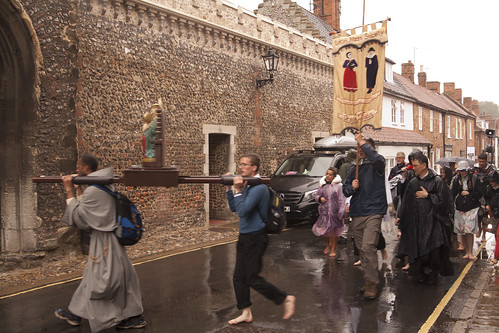 |
| Qui autem perseveraverit usque in finem, hic salvus erit. (Matt 24:13) |
LMS Canonical Notes on the Responsa ad dubia
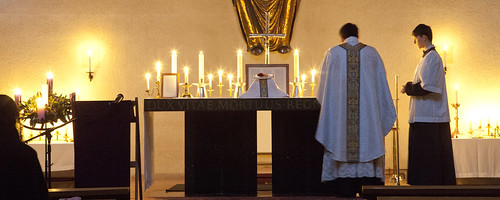 |
| Rorate Mass last Saturday, Holy Rood, Oxford |
Cross-posted from Rorate Caeli.
You can read the Latin Mass Society's discussion of the Congregation for Divine Worship's Responsa ad dubia, point by point, here.
Many canonists on the internet and off it have noticed that the Responsaissued by the CDW seem to be making demands on bishops and priests which go beyond the authority of a Roman Congregation to make. In some cases they seem to be taking away prerogatives from bishops which they are explicitly given by Canon Law, and even the Second Vatican Council. The Supreme Legislator, the Holy Father, can of course change Canon Law, but it would be ludicrous to suggest that the Congregation for Divine Worship can do so. Since the Holy Father has—presumably, deliberately—given the Responsa only generic, not ‘specific’, approval, it is the Congregation’s authority which is at issue.
In the same way, the Responsa presents itself as an interpretation of Traditionis Custodes. There has been much discussion online about how exactly, and to whom, this interpretation is binding. The key point, however, is that an interpretation of a legal document at best borrows its force from the document it is interpreting. The Responsa cannot add to the obligations set out by Traditionis Custodes, and if it attempted to do so, it would fail. This kind of document falls under the category noted in Canon 33.1:
General executory decrees, even if they are issued in directories or in documents of another name, do not derogate from laws, and their prescripts which are contrary to laws lack all force.
Thus Bishops retain their authority to make judgements about the justification for binantion (priests saying extra Masses), under Canon 905.2; they retain their authority to abrogate the law of the Church for the good of souls, under Canon 87.1; and they surely retain their authority to judge whether their own priests are dangerous schismatics. I dare say parish priests retain their authority to publish what they think appropriate in their parish bulletins, and their bishops retain the right to overseas this, without having arbitrary judgements, made without knowledge of local circumstances, imposed on them from a Roman Dicastery.
As JD Flynn remarks on this subject: “the pope has emphasized frequently that diocesan bishops don’t answer to curial prefects, and shouldn’t answer to curial prefects—that the curia was made for bishops, not bishops for the curia.”
In considering the Responsa, bishops may nevertheless decide that the message they convey from the CDW is enough, even without legal force, to persuade them to make life more difficult for Catholics attached to the older liturgy. In making this judgment, they must at least be mindful of the consideration which presumably motivated them or their predecessors in allowing celebrations in the first place: the good of souls, which the Responsa itself regard as the justification for allowing it.
LMS guidance on the Responsa here.
Some more discussions by canonists:
https://chiesaepostconcilio.blogspot.com/2021/12/responsa-ad-dubia-sullapplicazione-del.html(Italian)
Keep calm and find out where go to Traditional Mass
 |
| Rorate Mass at Holy Rood, Abingdon Road, Oxford, last Saturday (with a very slow shutter speed!) |
A small difficulty with the Responsa ad dubia
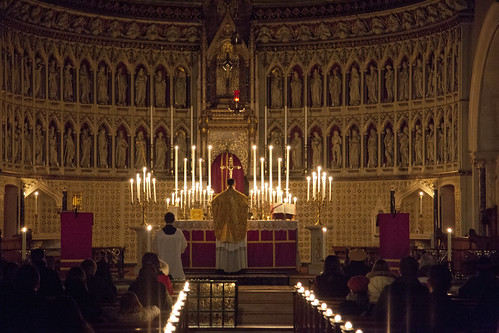 |
| Rorate Mass at the Oxford Oratory, England |
All the Church’s legislation needs to be understood in light of common sense, of previous legislation with greater authority, and of the Church’s the fundamental theological and moral principles. These principles of are of particular importance when we consider legislation which appears, on the one hand, to be hastily composed, and on the other, to have far-reaching, and perhaps unforeseen, consequences.
The Responsa provide a good illustration of this.
It appears that the Congregation for Divine Worship are not aware that, for historical reasons, that Rite of Communion for the Faithful used in the old Mass is not found in the 1962 Missale Romanum.
I noticed this when I was preparing the Latin Mass Society's Ordinary Prayers of the Traditional Mass. Up until the inter-war period Communion was not distributed at Mass, so the rite, which was used outside Mass, was and remains in the Rituale Romanum. This rite is used in Mass after the Priest's Communion. The Missal skips from that the Postcommunion Prayer.
This means that if the Rituale is forbidden for use, but the Missale is not, outside ‘personal parishes’, as the Responsa proposes, this would logically imply that the Faithful could not (outside a personal parish) receive Holy Communion at celebrations of the 1962 Missale. However, this conflicts with all three of the above-mentioned principles: common sense, previous legislation of greater authority (see Canons 213, 912, 918, 923), and the fundamental principle of the good of souls (see Canon 1752).
One thing this makes clear is the lack of understanding of the Traditional liturgy within the Congregation for Divine Worship. They don't seem to have people there with a thorough knowledge of the books and how they interact. The Fourth Section of the CDF, which used to deal with matters connected with the Old Mass, did have them, but these men have not been asked to join the CDW to assist the Prefect, Archbishop Roche, with these complicated matters.
Indeed, at one point, the Responsa actually denies the existence of a separate volume containing the 1962 Lectionary. They have never heard, evidently, of a useful little book, the Evangeliorum, often used at Solemn Masses by the Deacon for proclaiming the Gospel.
Equally, I strongly suspect that the officials at the CDF have little if any idea of the differences between the liturgical text used in the Lectionary, and what you will find in the Bible translations authorised for liturgical use in the Novus Ordo by Bishops' Conferences. The liturgical text is not always continuous; there are opening and occasionally ending formulae not found in the Scripture; and it is the Clementine Vulgate, which can differ significantly from the original texts translated by these Scripture translations.
But back to the Rituale. The fact is, the different books—the Missale, the Rituale, the Pontificale, the Breviary, and other books the CDF seems completely unaware of, such as the Ritus Servandus,the Manual of Prayers, and the Canon Pontificale,are inseparable components of the ancient liturgy which, as Pope Benedict noted, has never been abrogated. You can't just have one and not the others. It simply doesn't work like that.
These observations are not intended to prompt people to disobey the law as given. Rather, the point is to understand the law's real meaning. The meaning of a legislative text is conditioned by its wider legal and theological context, and the complexities of its subject matter. While the above illustration is a particularly clear example, this principle is applicable to the whole document, as it is to all ecclesial legislation.
Laws which have obviously ridiculous or harmful consequences, or which are confused, unclear, or impossible to implement, do not have force. I don't say: you can disobey them. I say: a proper understanding of them is that they do not have force.
Rorate Mass at the Oxford Oratory
'Ministers of Christ' by Peter Kwasniewski
When this project was first conceived over a year ago, my initial idea was to write a critique of Paul VI’s attempted suppression of the subdiaconate and minor orders, of John Paul II’s permission of altar girls, and of Francis’s innovation of female “acolytes” and “lectors.” During its writing, however, the scope of the book considerably broadened to include a full-scale presentation and defense of the traditional sevenfold manifestation of Orders — priest, deacon, subdeacon, lector, acolyte, exorcist, and porter — together with an explanation of the distinct but mutually supporting roles of clergy and laity. In order to accomplish this, I stepped back further to look at the distinction and complementarity of the sexes in the order of creation and the order of redemption, a perspective that provides the ultimate foundation for the Church’s entire teaching on states of life, roles, and ministries. In this way the book serves as a response to the “gender madness” that has afflicted the world and has increasingly infected the Church. ...
Pilgrimage to Lyford Grange
Annual Requiem in St Benet's Hall
It is always said by Fr Edward van den Burgh of the London Oratory, an alumnus of the Hall, and accompanied with chant by the Schola Abelis, Oxford's Catholic chant schola, which I founded. This year we were directed by Matthew Vine.
We usually manage a High Mass, as this year. The deacon was the Rev James Forde-Johnson, a permanent deacon, and the subdeacon was Dominican from just down the road in Blackfriars, Br Albert Robertson.
An anti-Christian cultural hegemony
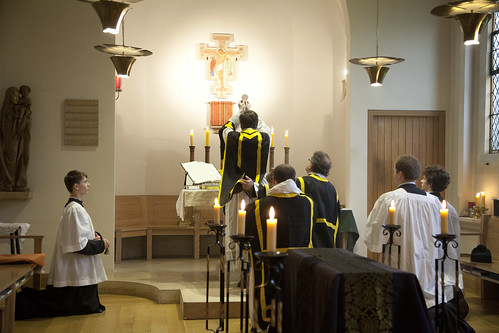 |
| Mass last Saturday: annual Requiem in St Benet's Hall, Oxford. |
My latest on Voice of the Family
Mantel, like the author Philip Pullman, seems to have “issues”, as the modern jargon has it, with Catholic faith and culture. She has no intrinsic significance — there have always been strange people around — what is important is the use which has been made of her: she has been awarded all kinds of prizes and her repulsive novels have been adapted for the Royal Shakespeare Company. Pullman, another winner of multiple awards, has had one book made into a film and another into a play. Both writers have received the accolade of special editions of their works done for the bibliophiles of the Folio Society.
The publicity machines have nevertheless found it difficult to explain these peculiar individuals. Mantel was initially praised for the historical accuracy and realism of her work but, as real historians began to notice her material, she hastily rebranded it as a very fictional kind of historical fiction. After pocketing prizes for children’s books, Pullman decided, as his graphic descriptions of child torture began to get a bit out of hand, that this was just a misunderstanding; no, he was writing for adults.
Such U-turns would have sunk lesser folk, but the secularist establishment needs Mantel and Pullman. They possess some literary skill and their work can be used to counter-balance and even to exclude the Christian narratives given to us by writers of a previous generation: notably, Robert Bolt’s play and film, A Man for All Seasons, about St Thomas More, and the children’s books of C.S. Lewis. Literature and historical memory is being remade in the snarling image of secular modernity.
Mass celebrated for Vladimir Ashkenazy
As well as presenting the distinguished conductor and pianist Vladimir Ashkenazy with the De Saventhem Medal, the Federation had a Mass celebrated for the good estate of his family through the Latin Mass Society, on the feast of St Cecelia, the Patron Saint of music. (More about this here.)
It was a Missa Canata, celebrated by Fr Gabriel Diaz Patri, and accompanied by polyphony sung by the Southwell Consort led by Dominic Bevan.
Support the Latin Mass Society





